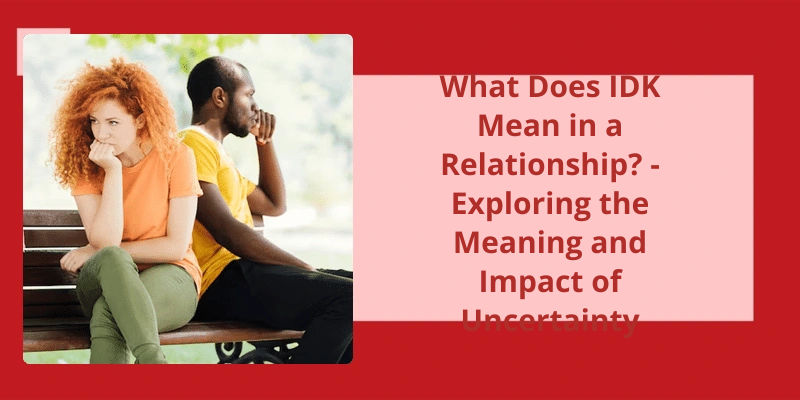In the world of relationships, where communication is paramount, every word and abbreviation carries a weight of significance. Amidst the flurry of digital conversations, it can be confusing to decipher the true meaning behind every message. And sometimes, a simple abbreviation like "idk" can leave us scratching our heads. As we navigate the landscape of modern relationships, unveiling the significance of each shorthand and cultural nuance is crucial for a healthy and fulfilling connection. Today, we will unravel the mysteries behind the meaning of "idk" and explore how it can impact relationships in various situations.
What Does IDK Mean in Text From a Girl?
If you receive a text from a girl that includes the abbreviation IDK, it’s likely that she’s indicating uncertainty or confusion about a particular topic. While IDK is often used in casual conversation to express a lack of knowledge or information, it can also indicate that someone is unsure of their own thoughts or opinions on a matter.
Overall, while receiving an IDK response from a girl may not be the most satisfying answer, it’s still a valuable piece of information that can help you navigate the conversation more effectively. By asking follow-up questions and engaging in thoughtful communication, you may be able to gain a better understanding of the girls thoughts and feelings, and move the conversation forward in a positive direction.
It’s not uncommon for guys to face confusion when they get “IDK” as a response from a girl they want to ask out. While it’s not a straightforward answer, it often indicates a lack of decision or potential disinterest. In the following paragraphs, we’ll dive deeper into the meaning behind “IDK” and what it could mean for your romantic pursuit.
What Does It Mean When a Girl Replies With IDK?
When a girl replies with IDK, it can be a confusing response for many people. This acronym stands for “I don’t know,” indicating a lack of clarity or indecisiveness on the topic at hand. In the context of asking a girl out, this response can mean a variety of things. It could be interpreted as a simple non-committal response, indicating that she’s unsure of whether or not she’d like to go out with you.
However, it’s important to consider the tone in which this response is given. If the girl seems hesitant or unsure, it could be an indicator that she isn’t interested in pursuing a romantic relationship with you. Additionally, if the girl has consistently responded with IDK in the past, it may be a sign that she isn’t interested in moving forward with the relationship.
On the other hand, if the girl seems genuinely interested in getting to know you better, a response of IDK may mean that she’s simply unsure of how to proceed. She may need more time to think about the proposal, or she may be cautious about jumping into a new relationship. In this case, it’s important to give her space and time to make a decision on her own terms.
It’s also possible that the girl is using IDK as a way to avoid hurting your feelings. If she isn’t interested in going out with you, she may not know how to tell you directly. Using an ambiguous response like IDK gives her an easy out, while also avoiding the potential awkwardness of a direct rejection.
The meaning of IDK will vary depending on the specific situation and the girl in question. The best course of action is to take the response at face value, while remaining open and communicative about your intentions and feelings. With time and patience, a clearer understanding of the situation will emerge, allowing you to make informed decisions about how to proceed.
Now that we know who IDK is, let’s dive into the meaning behind one of his most commonly used phrases in rap: “IDK.” While it may seem obvious, there could be more to it than meets the eye.
What Does IDK Mean in Rap?
IDK is a term that’s been used in rap lyrics for decades. It’s one of many acronyms used in the genre, and it’s meaning has evolved over time depending on the context.
IDK has become an important figure in the world of underground rap, and his music has been lauded for it’s uncompromising lyrical content and fearless approach to social commentary. He’s been known to tackle a wide range of topics in his lyrics, from race and politics to religion and the environment. His music is often introspective and deeply personal, but it also challenges listeners to think critically about the issues that affect their daily lives.
Some of IDKs most well-known tracks include “Pizza Shop Extended,” “Moral,” and “Once Upon a Time Freestyle.”. These songs showcase IDKs range as an artist, from his signature punchy rapping style to his soulful singing and smooth production. In 2020, IDK took things to the next level with the release of his debut studio album, “Is He Real?”, which was hailed as a masterpiece by critics and fans alike.
Now that we’ve covered what IDK means in the world of social media, let’s take a closer look at some of the other popular acronyms and slang terms that are floating around on these platforms. From LOL to SMH, there are countless phrases and expressions that can be difficult to decipher if you’re not in the know. So, whether you’re a seasoned social media pro or just getting started, read on for a crash course in internet lingo.
What Is Idk in Snapchat?
It’s a common acronym used by many people worldwide to indicate that they don’t know the answer to a particular question or they don’t have enough information to form a conclusive answer. In the context of Snapchat, IDK is usually used as a response to questions asked by other Snapchat users.
Snapchat is a popular social media platform where users share pictures, videos, and text messages with their friends. It’s become a popular medium for communication among millennials and Gen Zs. Users can send direct messages to their friends, create stories, and participate in group chats. Snapchat has a unique set of features like filters, lenses, and geotags that make the app engaging and exciting.
In recent years, the use of acronyms and shorthand in online communication has become increasingly common. It’s a way for users to communicate quickly and efficiently. IDK is one such acronym that’s gained immense popularity in recent years. It’s a universally understood term and is recognized across the globe as an abbreviation for “I Dont Know.”
It’s a convenient way of communicating uncertainty or doubt without having to type out a lengthy response.
Other Popular Acronyms and Shorthand in Online Communication, Including Their Meanings and Usage.
- LOL – Laugh Out Loud
- BRB – Be Right Back
- OMG – Oh My God
- AFK – Away From Keyboard
- IMO – In My Opinion
- BTW – By The Way
- IMHO – In My Humble Opinion
- ICYMI – In Case You Missed It
- IRL – In Real Life
- TL;DR – Too Long; Didn’t Read
Now that we understand how IDK is used in casual conversations, let’s explore it’s limitations and implications in various situations.
Is IDK a Answer?
“) In fact, IDK is often more practical than typing out the full phrase since it saves on time and typespace, especially when mobile phones or chat boxes have a limited capacity for characters.
However, IDK may not be an appropriate answer in more formal contexts like business meetings, job interviews, or academic discussions. In these situations, providing an unclear or tentative answer could negatively affect your credibility or competence. In contrast, it’s better to admit that you don’t know something and offer to do some research or follow up with more information at a later time. This shows that you’re diligent, reliable, and willing to go the extra mile to find answers.
Moreover, using IDK as a default response could contribute to a culture of apathy or disinterest where people are too lazy or uninterested to seek knowledge or understanding. This could have serious consequences in personal, professional, or societal realms where critical thinking, curiosity, and learning are highly valued. Instead of settling for IDK, you can foster a growth mindset, continuous learning, and intellectual humility by cultivating a habit of asking questions, seeking feedback, and pursuing knowledge proactively.
At the same time, it’s important to acknowledge that IDK can be an honest and valid answer in certain situations where the question is complex, ambiguous, or beyond your expertise. Nobody knows everything, and it’s okay to admit your ignorance or uncertainty when faced with such questions. In fact, being honest about your limitations can signal your humility, honesty, and openness to learning from others who’ve different perspectives or experiences.
Whether IDK is an answer or not depends on the context, purpose, and audience for the conversation. On one hand, IDK can be a useful shorthand for expressing uncertainty or indecisiveness in informal or casual settings where speed and convenience are valued. On the other hand, IDK may not be a sufficient or appropriate response in more formal, professional, or intellectual contexts where clarity, accuracy, and credibility are expected. Ultimately, it’s up to each individual to decide when and how to use IDK based on their own judgment, values, and goals.
In today’s digital age, texting and chatting have become a common way of communication. With the rise of shorthand and emojis, it can be hard to keep up with all the slang and acronyms used in text messages. IDK and IDC are two such examples of popular shorthand that have gained popularity amongst texters. While they may seem simple enough, it’s always useful to know what these terms mean and when to use them.
What Does IDK and IDC Mean in Text?
When it comes to communication, text messaging has become one of the most popular forms of interaction. These quick, convenient, and immediate messages allow for real-time conversations between individuals. In the world of texting, short forms and acronyms have become common practice. Two of these short forms that are widely used are IDK and IDC.
IDK stands for “I Don’t Know”. The acronym is often used in instances where an individual is unsure of the answer to a question or doesn’t possess enough information to offer a response. It’s commonly used in casual conversations, especially when individuals are trying to find out a piece of information or clarify something. To signal that you don’t know what the answer is, you can simply jot down “IDK” and continue the conversation.
IDC, on the other hand, means “I Don’t Care”. It’s an acronym used when someone is indifferent or apathetic to a topic. It’s frequently utilized when someone tries to discuss something that isn’t important to the individual. IDC is often a sign of disinterest, boredom, or simply a lack of investment in the topic. When someone writes IDC in a text message conversation, it simply means that they’re not interested in the topic or are focused on something else.
In some instances, people may use IDK and IDC together in the same text message to demonstrate that they don’t know something and also don’t care to know. This can be interpreted as saying, “I don’t know the answer to your question, and I don’t care.”
For instance, using IDC as a response to a significant other’s opinion or feelings may come across as a lack of empathy or disregard for their emotions. Therefore, it’s essential to use these acronyms appropriately and with caution.
Since they’re commonly used in informal settings, it’s important to use them in the proper context to avoid misinterpretation. Overall, both acronyms are great for quick and straightforward communication when used correctly.
Common Text Message Acronyms and Their Meanings
We will explore the meanings of popular acronyms that are commonly used in text messages.
Conclusion
It could signify uncertainty or a lack of knowledge about a particular situation or feeling. It could also be seen as a way to avoid giving a direct answer or to buy time for further reflection. However, it’s important to note that excessive use of idk in communication can lead to misunderstandings, confusion, and even frustration between partners. Open and honest communication is key in any healthy relationship, and if either partner finds themselves regularly using idk, it may be worth exploring deeper to address any underlying issues in the relationship.






